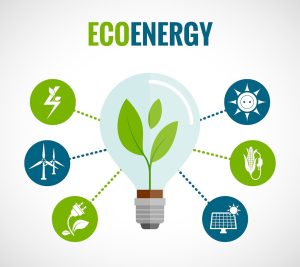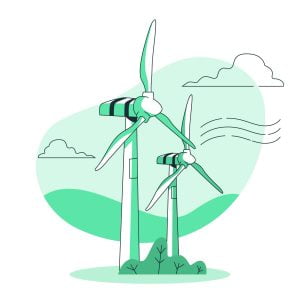
Climate change and environmental degradation are among the biggest challenges facing our world today. The increasing global demand for energy has led to the depletion of finite resources and the release of harmful pollutants.
As a result, there has been a growing focus on clean energy technologies that provide sustainable solutions for the future. In this blog, we will explore the importance of clean energy technologies and their potential to transform the way we generate, distribute, and consume energy.

What is Clean Energy?
Clean energy refers to energy that is generated from renewable sources and has minimal impact on the environment. Examples of clean energy sources include solar, wind, hydropower, geothermal, and biomass. Unlike traditional fossil fuels, clean energy sources are sustainable, abundant, and produce minimal greenhouse gas emissions.
Clean energy refers to sources of power that produce little to no greenhouse gas emissions, air pollution, or other harmful byproducts. Unlike traditional energy sources such as coal, oil, and natural gas, clean energy is renewable and sustainable, making it a key component of efforts to combat climate change and create a more sustainable future.
One of the most important aspects of clean energy is that it is renewable. This means that the sources of clean energy are constantly replenished, unlike fossil fuels which are finite resources that will eventually run out. The most common sources of clean energy include solar, wind, hydroelectric, geothermal, and biomass energy.
Solar energy is perhaps the most well-known and widely used form of clean energy. It harnesses the power of the sun to generate electricity, and it can be used in both residential and commercial applications. Solar panels can be installed on rooftops or in large solar farms to generate clean energy for homes, businesses, and even entire communities.
Wind energy is another popular source of clean energy. Wind turbines are used to capture the energy of the wind and convert it into electricity. Wind farms can be found in many parts of the world, and they are becoming increasingly common as the demand for clean energy grows.
Hydroelectric energy is generated by harnessing the power of moving water. It is one of the oldest forms of clean energy and is still widely used today. Hydroelectric power plants can be found in many parts of the world, and they can provide a significant amount of clean energy to nearby communities.
Geothermal energy is generated by harnessing the heat that is naturally produced by the earth’s core. It is a relatively new form of clean energy, but it has great potential for future development. Geothermal power plants can be found in several countries around the world, including Iceland, the United States, and Italy.
Finally, biomass energy is generated by burning organic matter such as wood, crops, and waste products to produce electricity. While it is not as clean as some of the other forms of clean energy, it is still a renewable and sustainable source of power.
In conclusion, clean energy is a crucial component of efforts to combat climate change and create a more sustainable future. By harnessing the power of the sun, wind, water, and other natural resources, we can create a world that is powered by clean, renewable energy sources.
Why is Clean Energy Important?
Clean energy is important for several reasons:
- Environmental Benefits:
Clean energy sources produce minimal greenhouse gas emissions, reducing the impact of climate change and air pollution.
Clean energy is not only beneficial for its renewable and sustainable nature, but it also has significant environmental benefits. By reducing greenhouse gas emissions and air pollution, clean energy helps to mitigate the negative impacts of climate change and improve air quality.
One of the biggest environmental benefits of clean energy is its ability to reduce greenhouse gas emissions. Traditional energy sources like coal, oil, and natural gas emit large amounts of carbon dioxide and other greenhouse gases when burned, contributing to climate change.
In contrast, clean energy sources like solar, wind, and hydroelectric power emit little to no greenhouse gases, making them an important tool in the fight against climate change.
Another significant environmental benefit of clean energy is its ability to improve air quality. Traditional energy sources like coal and oil produce harmful pollutants that can cause respiratory problems and other health issues. In contrast, clean energy sources like wind and solar power produce no harmful emissions, making them a much healthier and safer alternative.
In addition to reducing greenhouse gas emissions and improving air quality, clean energy can also help to conserve natural resources.
Traditional energy sources like coal, oil, and natural gas are finite resources that will eventually run out. Clean energy sources, on the other hand, are renewable and sustainable, meaning that they can be used indefinitely without depleting natural resources.
Clean energy can also have positive impacts on wildlife and ecosystems. Traditional energy sources like coal and oil can have devastating impacts on wildlife and their habitats, from oil spills to habitat destruction. In contrast, clean energy sources like wind and solar power have minimal impact on wildlife and their habitats, making them a much safer and more sustainable option.
Clean energy is not only renewable and sustainable, but it also has significant environmental benefits. By reducing greenhouse gas emissions, improving air quality, conserving natural resources, and protecting wildlife and ecosystems, clean energy is an important tool in creating a more sustainable future for ourselves and for the planet.
Energy Security:
Clean energy sources are abundant and domestically available, reducing our dependence on foreign oil and gas.
Energy security refers to the reliable and sustainable access to energy sources for a country or region. It is an important aspect of national and global security as energy plays a critical role in economic development, social stability, and environmental sustainability.One of the key benefits of clean energy in terms of energy security is its ability to diversify energy sources. Traditional energy sources like oil and gas are often imported from other countries, which can create dependence on foreign suppliers and leave countries vulnerable to price shocks and supply disruptions.
In contrast, clean energy sources like solar, wind, and hydroelectric power are often locally sourced and can be more easily controlled and managed, reducing the risk of supply disruptions and improving energy security.
Another benefit of clean energy in terms of energy security is its ability to enhance energy independence. Countries that rely heavily on traditional energy sources like oil and gas are often subject to the fluctuations of global markets and the decisions of foreign suppliers.
By developing their own clean energy sources, countries can reduce their dependence on foreign energy sources and increase their energy independence.
Clean energy can also have positive economic impacts on a country or region. By developing and investing in clean energy sources, countries can create new jobs, boost economic growth, and reduce their dependence on foreign energy sources. This can help to improve economic stability and reduce vulnerability to external economic shocks.
Finally, clean energy can have important geopolitical implications for global security. Countries that are heavily dependent on traditional energy sources are often subject to geopolitical tensions and conflicts, as rival countries compete for access to these resources.
By developing and investing in clean energy sources, countries can reduce their dependence on traditional energy sources and reduce the potential for conflict.
In conclusion, clean energy has significant benefits in terms of energy security. By diversifying energy sources, enhancing energy independence, boosting economic growth, and reducing geopolitical tensions, clean energy is an important tool for creating a more secure and sustainable future for all.
Economic Benefits:
Clean energy technologies create jobs, drive economic growth, and reduce energy costs over the long term.
Clean energy not only benefits the environment and improves energy security, but it also has important economic benefits. By creating new job opportunities, reducing energy costs, and boosting economic growth, clean energy can have positive impacts on local and global economies.
One of the key economic benefits of clean energy is its ability to create new job opportunities. The clean energy sector is a rapidly growing industry, with a wide range of jobs from installation and maintenance to research and development. As countries and companies invest in clean energy, they are creating new job opportunities and boosting economic growth.
Another benefit of clean energy is its ability to reduce energy costs over the long term. While clean energy sources often require significant upfront investment, they can provide cost savings over the lifetime of the system. For example, solar panels may require significant upfront investment, but they can provide significant savings on electricity bills over the long term. This can help to reduce the overall cost of energy and boost economic growth.
Clean energy can also have positive impacts on energy-intensive industries. By reducing energy costs and improving energy efficiency, clean energy can help to make these industries more competitive and sustainable.
For example, the use of renewable energy in the manufacturing sector can help to reduce costs and improve efficiency, making these industries more competitive in the global market.
Finally, clean energy can have important economic impacts on rural and underdeveloped communities. By investing in clean energy projects in these communities, countries and companies can create new job opportunities and improve access to affordable and sustainable energy. This can help to reduce poverty and improve economic development in these areas.
Clean energy has significant economic benefits, from creating new job opportunities to reducing energy costs and boosting economic growth. By investing in clean energy, countries and companies can create a more sustainable and prosperous future for all.
Clean Energy Technologies
There are several clean energy technologies that have the potential to transform the energy sector:
Solar Power:
Solar power involves the use of solar panels to generate electricity from the sun’s energy. It is one of the fastest-growing sources of clean energy and has the potential to provide energy to remote areas.
Solar power is a renewable energy source that harnesses the power of the sun to generate electricity. It is one of the fastest-growing sources of clean energy in the world, with significant potential to reduce greenhouse gas emissions, improve energy security, and boost economic growth.
Solar power works by converting sunlight into electricity using solar panels, which are made up of photovoltaic (PV) cells. When sunlight hits the PV cells, it causes a flow of electrons, creating an electrical current that can be used to power homes, businesses, and other buildings.
One of the key benefits of solar power is its ability to reduce greenhouse gas emissions. Unlike traditional sources of electricity, solar power does not rely on fossil fuels, which release carbon dioxide and other harmful pollutants into the atmosphere. By using solar power, countries and companies can reduce their carbon footprint and help to mitigate the impacts of climate change.
Solar power can also help to improve energy security by diversifying energy sources. Countries that rely heavily on traditional sources of energy like oil and gas are often subject to price shocks and supply disruptions. By investing in solar power, countries can reduce their dependence on these sources and improve their energy security.
Another benefit of solar power is its ability to provide electricity to remote and underdeveloped areas. In many parts of the world, access to electricity is limited or non-existent, which can have significant impacts on economic development, education, and healthcare.
By investing in solar power, countries and companies can provide access to affordable and sustainable electricity, improving the quality of life for millions of people around the world.
Finally, solar power can have important economic benefits. By creating new job opportunities and boosting economic growth, solar power can help to drive economic development and reduce poverty.
In addition, solar power can provide cost savings over the long term, as the cost of solar panels continues to decrease and energy efficiency improves.
In conclusion, solar power is a clean and renewable source of energy that has significant benefits for the environment, energy security, and economic development. By investing in solar power, countries and companies can create a more sustainable and prosperous future for all.
Wind Power:
Wind power involves the use of wind turbines to generate electricity. It is a mature technology that has become increasingly cost-competitive with fossil fuels. Wind power is a renewable energy source that harnesses the power of wind to generate electricity.
It is one of the fastest-growing sources of clean energy in the world, with significant potential to reduce greenhouse gas emissions, improve energy security, and boost economic growth. Wind power works by using turbines to capture the kinetic energy of the wind and convert it into electricity.
When the wind blows, it causes the blades of the turbine to spin, which drives a generator that produces electricity. Wind turbines can be installed on land or offshore, depending on the availability and strength of the wind.
One of the key benefits of wind power is its ability to reduce greenhouse gas emissions. Unlike traditional sources of electricity, wind power does not rely on fossil fuels, which release carbon dioxide and other harmful pollutants into the atmosphere. By using wind power, countries and companies can reduce their carbon footprint and help to mitigate the impacts of climate change.
Wind power can also help to improve energy security by diversifying energy sources. Countries that rely heavily on traditional sources of energy like oil and gas are often subject to price shocks and supply disruptions. By investing in wind power, countries can reduce their dependence on these sources and improve their energy security.

Another benefit of wind power is its ability to provide electricity to remote and underdeveloped areas. In many parts of the world, access to electricity is limited or non-existent, which can have significant impacts on economic development, education, and healthcare.
By investing in wind power, countries and companies can provide access to affordable and sustainable electricity, improving the quality of life for millions of people around the world.Finally, wind power can have important economic benefits. By creating new job opportunities and boosting economic growth, wind power can help to drive economic development and reduce poverty. In addition, wind power can provide cost savings over the long term, as the cost of wind turbines continues to decrease and energy efficiency improves.
In conclusion, wind power is a clean and renewable source of energy that has significant benefits for the environment, energy security, and economic development. By investing in wind power, countries and companies can create a more sustainable and prosperous future for all.
Hydropower:
Hydropower involves the use of water to generate electricity. It is a mature technology that provides clean, reliable energy.
Hydropower is a renewable energy source that harnesses the power of water to generate electricity. It is one of the oldest and most established forms of renewable energy, with significant potential to reduce greenhouse gas emissions, improve energy security, and boost economic growth.
Hydropower works by using turbines to convert the kinetic energy of falling or flowing water into electricity. A dam or reservoir is typically used to store water, which can be released through a turbine to generate electricity. Hydropower can also be generated by run-of-river systems, which use the natural flow of a river to turn turbines.
One of the key benefits of hydropower is its ability to reduce greenhouse gas emissions. Unlike traditional sources of electricity, hydropower does not rely on fossil fuels, which release carbon dioxide and other harmful pollutants into the atmosphere.
By using hydropower, countries and companies can reduce their carbon footprint and help to mitigate the impacts of climate change.
Hydropower can also help to improve energy security by diversifying energy sources. Countries that rely heavily on traditional sources of energy like oil and gas are often subject to price shocks and supply disruptions. By investing in hydropower, countries can reduce their dependence on these sources and improve their energy security.
Another benefit of hydropower is its ability to provide electricity to remote and underdeveloped areas. In many parts of the world, access to electricity is limited or non-existent, which can have significant impacts on economic development, education, and healthcare.
By investing in hydropower, countries and companies can provide access to affordable and sustainable electricity, improving the quality of life for millions of people around the world.
Finally, hydropower can have important economic benefits. By creating new job opportunities and boosting economic growth, hydropower can help to drive economic development and reduce poverty.
In addition, hydropower can provide cost savings over the long term, as the cost of hydropower technology continues to decrease and energy efficiency improves.
Hydropower is a clean and renewable source of energy that has significant benefits for the environment, energy security, and economic development. By investing in hydropower, countries and companies can create a more sustainable and prosperous future for all.
- Geothermal Power:
Geothermal power involves the use of heat from the earth’s core to generate electricity. It is a reliable and sustainable source of energy.
Geothermal energy is a renewable energy source that harnesses the natural heat of the earth to generate electricity. It is a clean and reliable source of energy with significant potential to reduce greenhouse gas emissions, improve energy security, and boost economic growth.
Geothermal energy works by tapping into the natural heat of the earth’s crust. In areas with high geothermal activity, water or steam is heated by the earth’s natural heat and can be used to generate electricity. Geothermal power plants typically use steam to turn turbines and generate electricity, similar to traditional power plants.
One of the key benefits of geothermal energy is its ability to reduce greenhouse gas emissions. Unlike traditional sources of electricity, geothermal energy does not rely on fossil fuels, which release carbon dioxide and other harmful pollutants into the atmosphere. By using geothermal energy, countries and companies can reduce their carbon footprint and help to mitigate the impacts of climate change.
Geothermal energy can also help to improve energy security by diversifying energy sources. Countries that rely heavily on traditional sources of energy like oil and gas are often subject to price shocks and supply disruptions. By investing in geothermal energy, countries can reduce their dependence on these sources and improve their energy security.
Another benefit of geothermal energy is its ability to provide electricity to remote and underdeveloped areas. In many parts of the world, access to electricity is limited or non-existent, which can have significant impacts on economic development, education, and healthcare. By investing in geothermal energy, countries and companies can provide access to affordable and sustainable electricity, improving the quality of life for millions of people around the world.
Finally, geothermal energy can have important economic benefits. By creating new job opportunities and boosting economic growth, geothermal energy can help to drive economic development and reduce poverty. In addition, geothermal energy can provide cost savings over the long term, as the cost of geothermal technology continues to decrease and energy efficiency improves.
In conclusion, geothermal energy is a clean and renewable source of energy that has significant benefits for the environment, energy security, and economic development. By investing in geothermal energy, countries and companies can create a more sustainable and prosperous future for all.
Biomass Energy:
Biomass energy involves the use of organic materials, such as wood chips and agricultural waste, to generate electricity. It is a renewable and carbon-neutral energy source.
Biomass energy is a renewable energy source that is derived from organic materials such as wood, crops, and agricultural waste. It is a clean and versatile source of energy with significant potential to reduce greenhouse gas emissions, improve energy security, and support sustainable economic development.
Biomass energy works by converting organic materials into heat, electricity, or fuel. Biomass can be burned directly to generate heat or used in power plants to produce electricity. It can also be converted into biofuels such as ethanol and biodiesel, which can be used to power vehicles.
One of the key benefits of biomass energy is its ability to reduce greenhouse gas emissions. Unlike traditional sources of energy, which rely on fossil fuels, biomass energy does not release carbon dioxide and other harmful pollutants into the atmosphere. By using biomass energy, countries and companies can reduce their carbon footprint and help to mitigate the impacts of climate change.
Biomass energy can also help to improve energy security by diversifying energy sources. Countries that rely heavily on traditional sources of energy like oil and gas are often subject to price shocks and supply disruptions. By investing in biomass energy, countries can reduce their dependence on these sources and improve their energy security.
Another benefit of biomass energy is its ability to support sustainable economic development. Biomass energy can create new job opportunities and support local communities, particularly in rural areas where biomass resources are often abundant. In addition, biomass energy can provide cost savings over the long term, as the cost of biomass technology continues to decrease and energy efficiency improves.
However, it is important to note that biomass energy can have negative environmental impacts if not managed sustainably. Unsustainable harvesting of biomass can lead to deforestation, soil degradation, and loss of biodiversity. Therefore, it is important to carefully manage biomass resources to ensure their sustainability.
Biomass energy is a renewable and versatile source of energy with significant benefits for the environment, energy security, and sustainable economic development. By investing in biomass energy and managing biomass resources sustainably, countries and companies can create a more sustainable and prosperous future for all.
Conclusion
Clean energy technologies are vital for addressing the challenges of climate change and environmental degradation. By transitioning to clean energy sources, we can reduce our reliance on finite resources and minimize the impact of energy production on the environment.
Solar, wind, hydropower, geothermal, and biomass energy are all viable options for clean energy generation. As we continue to develop and implement clean energy technologies, we can create a more sustainable and equitable future for generations to come.






Leave a Reply
You must be logged in to post a comment.